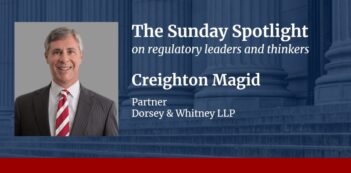
Scholars and regulatory commentators debate the significance of EPA’s recently proposed “transparency” rule.
“The era of secret science at EPA is coming to an end,” U.S. Environmental Protection Agency (EPA) Administrator Scott Pruitt announced in April 2018. His statement accompanied the announcement of a proposed rule that would limit EPA, when developing new significant regulations, to using only scientific studies with publicly available underlying data. Amid Pruitt’s already controversial tenure at EPA, the proposal of a “transparency rule” has reignited debate about the role of science and disclosure in the rulemaking process.
The proposed rule provides that scientific studies deemed “pivotal” to EPA’s significant regulatory actions would need to rely on data that are available “in a manner sufficient for independent validation.” Proponents argue that this requirement would increase accountability and accuracy by making it possible for the research community to check EPA’s use of science in policy decisions. This requirement, they contend, would address growing expectations for the replicability of results in scientific studies and help ensure that environmental regulations rely on the best science.
Critics, however, claim that the proposed transparency requirements would limit the types of scientific research available to EPA. They argue that the proposed policy change could rule out some of the most well-regarded epidemiological studies, many of which have provided the basis for past EPA regulations on air quality and toxic chemicals. Former EPA Administrator Gina McCarthy and former EPA official Janet G. McCabe, for example, have criticized these proposed restrictions as little more than a politically motivated “effort to cripple the agency.”
The comment period on the proposed rule, which EPA recently extended, closes on August 16.
This series in The Regulatory Review examines the significance of EPA’s push for data transparency in its rulemaking process. Contributors to the series include: Susan Dudley, director of the George Washington University Regulatory Studies Center, professor at the Trachtenberg School of Public Policy & Public Administration, and former Administrator of the Office of Information and Regulatory Affairs in the second Bush Administration; Wendy E. Wagner, Richard Dale Endowed Chair in Law, University of Texas at Austin School of Law; Rena Steinzor, Edward M. Robertson Professor of Law, University of Maryland Francis King Cary School of Law; and David Zorn, consultant at Mangum Economics and adjunct professor at the Antonin Scalia Law School, George Mason University.
The Regulatory Review is pleased to present this series of essays illuminating the important issues surrounding the role of data transparency in environmental regulations.
Increasing EPA’s Scientific Transparency
June 18, 2018 | Susan Dudley, George Washington University Regulatory Studies Center
Contrary to what the strong reactions to the U.S. Environmental Protection Agency’s “transparent science” proposal might suggest, the proposal is not as dramatic as either supporters or detractors imply. Its core principles actually conform with guidelines adopted by previous administrations.
Deconstructing Regulatory Science
June 19, 2018 | Wendy E. Wagner, University of Texas at Austin School of Law, and Rena Steinzor, University of Maryland Francis King Carey School of Law
Scott Pruitt recently opened another front in his battle to redirect the agency away from its mission to protect human health and the environment. This time, he cobbled together a proposed rule that would drastically change how science is considered during the regulatory process.
Science and Democratic Policy in a Data-Driven World
June 20, 2018 | David Zorn, Mangum Economics
Public access to the data underlying regulatory policies allows the public to see how much politics may be influencing those policies and to challenge them if they become unduly political. Public access would also facilitate meaningful public evaluation, collaboration, and input into the policymaking process.
A Real, Not Faux, Transparency Proposal for Regulatory Science
July 31, 2018 | Wendy E. Wagner, University of Texas at Austin School of Law, and Rena Steinzor, University of Maryland Francis King Carey School of Law
Of all the problems that plague EPA today, ensuring scientific transparency is not all that difficult. A real transparency proposal, as opposed to the Pruitt EPA’s faux proposal, would closely track the standards developed by the scientific community.



